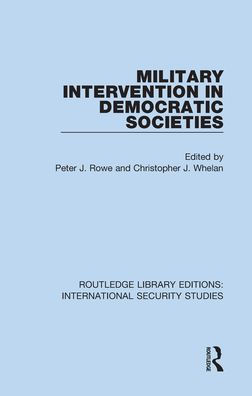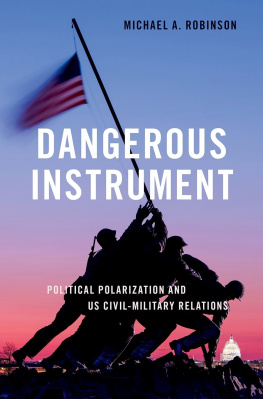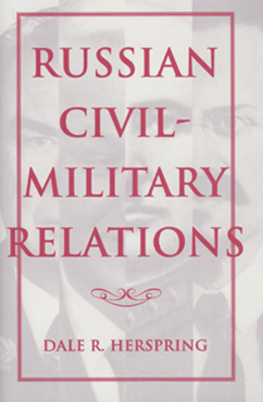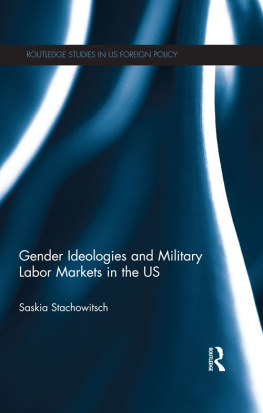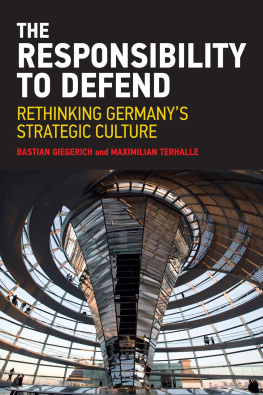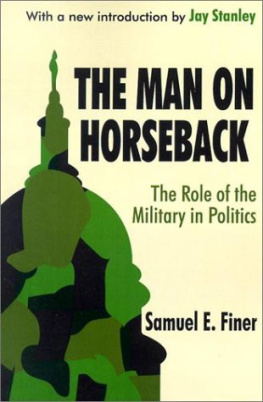The Military and Liberal Society
This book describes to what extent and in what ways the military policies of Western European societies are determined by liberal ideology.
A wide variety of issues affected by liberal ideology, including conscription, conscientious objection, military mission, military ethics and the professional identity of soldiers are addressed in the book. The empirical analysis draws on the cases of the German Bundeswehr (from the 1950s onwards), the Swedish Armed Forces (the transformation after the end of the Cold War), and the British Armed Forces (from the beginning of the twentieth century onwards). The books examination of these cases reveals that specific policies, institutions and practices are preferred because of their relation to liberalism. Since Samuel Huntingtons seminal book The Soldier and the State the literature on civilmilitary relations and military sociology depicts the relationship between liberal ideology and military security as intrinsically antithetical. This book is conceived as a critical debate with Huntington. Contrary to the notion of antithetical societalmilitary relationship, this book demonstrates that a meaningful adaptation of the military to the principles possessed by its parent society can be, more often than not, desirable also from the perspective of security strategy.
This book will be of considerable interest to students of civilmilitary relations, military sociology, Western European politics, security studies and IR.
Tomas Kucera is Assistant Professor in the Department of Security Studies, Charles University in Prague, Czech Republic.
Cass Military Studies
Security, Strategy and Military Change in the 21st Century
Cross-Regional Perspectives
Jo Inge Bekkevold, Ian Bowers and Michael Raska (eds)
Military Families and War in the 21st Century
Comparative Perspectives
Ren Moelker, Manon Andres, Gary Bowen and Philippe Manigart (eds)
Private Security Companies during the Iraq War
Military Performance and the Use of Deadly Force
Scott Fitzsimmons
Military Innovation in Small States
Creating a Reverse Asymmetry
Michael Raska
Researching the Military
Edited by Helena Carreiras, Celso Castro and Sabina Frderic
Drones and the Future of Air Warfare
The Evolution of Remotely Piloted Aircraft
Michael P. Kreuzer
Transforming Warriors
The Ritual Organization of Military Force
Edited by Peter Haldn and Peter Jackson
Space Warfare in the 21st Century
Arming the Heavens
Joan Johnson-Freese
Strategy Before Clausewitz
Linking Warfare and Statecraft, 14001830
Beatrice Heuser
Special Operations Forces in the 21st Century
Perspectives from the Social Sciences
Edited by Jessica Glicken Turnley, Kobi Michael and Eyal Ben-Ari
Civilians and Warfare in World History
Edited by Nicola Foote and Nadya Williams
The Military and Liberal Society
SocietalMilitary Relations in Western Europe
Tomas Kucera
First published 2018
by Routledge
2 Park Square, Milton Park, Abingdon, Oxon OX14 4RN
and by Routledge
711 Third Avenue, New York, NY 10017
Routledge is an imprint of the Taylor & Francis Group, an informa business
2018 Tomas Kucera
The right of Tomas Kucera to be identified as author of this work has been asserted by him in accordance with sections 77 and 78 of the Copyright, Designs and Patents Act 1988.
All rights reserved. No part of this book may be reprinted or reproduced or utilised in any form or by any electronic, mechanical, or other means, now known or hereafter invented, including photocopying and recording, or in any information storage or retrieval system, without permission in writing from the publishers.
Trademark notice: Product or corporate names may be trademarks or registered trademarks, and are used only for identification and explanation without intent to infringe.
British Library Cataloguing in Publication Data
A catalogue record for this book is available from the British Library
Library of Congress Cataloging in Publication Data
A catalog record for this book has been requested
ISBN: 978-1-138-65760-1 (hbk)
ISBN: 978-1-315-62125-8 (ebk)
Typeset in Times New Roman
by Wearset Ltd, Boldon, Tyne and Wear
Although writing a book is a rather solitary activity, this book would look different, or would not be at all, without the advice and support of many people and institutions who deserve my gratitude. First, thanks must be given to Aberystwyth Universitys Department of International Politics. This book greatly benefited from several years of vivid discussions with Professor Martin Alexander, Dr Kamila Stullerova, and Dr Berit Bliesemann de Guevara.
The case studies on the German Bundeswehr would be very different without the support of the Sozialwissenschaftliches Institut der Bundeswehr (SOWI) and the Helmut-Schmidt-Universitt/Universitt der Bundeswehr in Hamburg. Discussions with Dr Heiko Biehl and Dr Gerhard Kmmel at SOWI helped me to get direction at the beginning of my tour of the Bundeswehr and debates in Hamburg with Professor Bernd Wegner, Professor Elmar Wiesendahl and Oberstleutnant a.D. Dr Freiherr von Rosen reassured me that the direction was not completely wrong. Regarding Hamburg, however, my greatest gratitude belongs to Dr Michael Jonas without whom I would not have been able to visit this place at all and who spared no effort to make my stay a pleasant and memorable experience.
It is also important to mention the institutional support of the Institute of Political Studies at the Charles University which notably facilitated the writing of this book. Last, but not least, I must gratefully acknowledge financial support from the Czech Science Foundation under the standard research grant no. GA1602288S.


